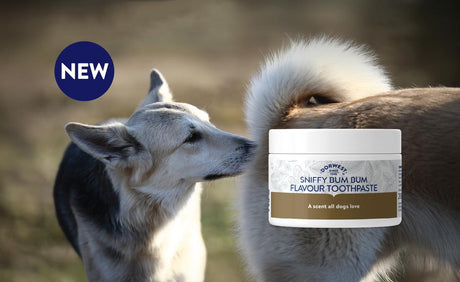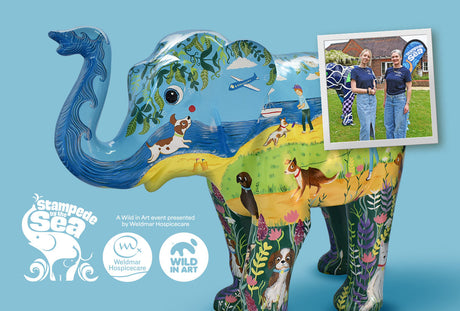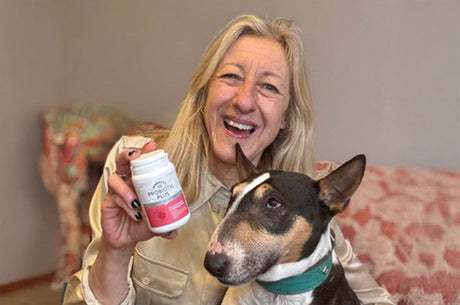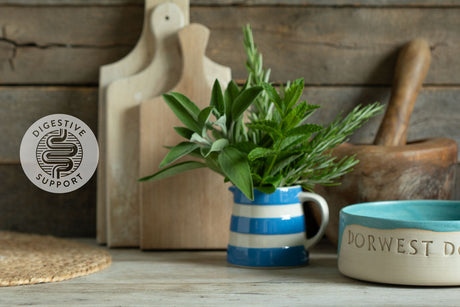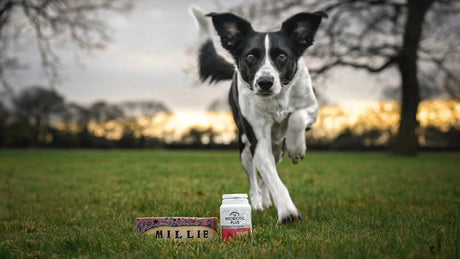
With those long summer evening behind us, there's a noticeable chill in the air, in particular during those early morning walkies! It can only mean one thing; the seasons are changing. There's lots of fun to be had with your dog in the autumn leaves and fresh winter air but there are a few dangers to be aware of. With this in mind, we're rounding up 5 hidden dangers in autumn and winter for dogs so you can feel prepared as the seasons' change...
1. Conkers & Acorns Galore

Walking through those gorgeous autumn leaves and admiring the changing colours around us can be a welcomed addition to any dog walk. Besides, so many dogs just love launching themselves into the fallen leaves! However, as the seasons deviate from autumn to winter, along come the dangers lurking nearby. In this case, in the form of conkers and acorns.
These signs of autumn start to fall as early as September. Whenever you spot them, be sure to keep them far from your inquisitive dog's mouth. The reason? Conkers are poisonous to dogs and if ingested they can cause toxicity in the kidneys and liver. Moreover, because of their size, they pose a choking hazard. Common symptoms of conker poisoning in dogs include diarrhoea, lethargy and excessive drooling. As conkers are poisonous to dogs, always consult your vet if you suspect your dog has eaten an acorn or conker.
2. Alabama Rot
Also known as Cutaneous and Renal Glomerular Vasculopathy (or CRGV), Alabama rot is a disease which causes painful skin lesions and impacts the kidneys blood vessels. Alabama rot in dogs presents itself as skin ulcers, kidney failure, and in the worst scenarios’ death. Whilst the cause of this disease is still unknown, it is a common belief mud might be a factor for Alabama rot in dogs.
Thankfully, there are a few ways to help in the prevention against this disease. The best chances to fight Alabama rot in dogs is to catch it early. You can prevent Alabama rot by limiting your dog’s access to mud, washing off any excess mud, and staying informed on any breakouts in your area. These are all good steps you can take to help keep your dog from harm’s way. Most cases are found between November and May so plan ahead to keep your pet in perfect health this winter. Always seek professional advice from your vet if you think your dog may have Alabama rot.
3. Road Safety
As those dark nights draw in, it is best to be extra cautious when it comes to road safety during winter for dogs. For example, you may want to consider reflective clothing for yourself and your dog e.g. a reflective lead or collar. Keep a torch to hand too. This makes you both easier to spot in the dark, particularly when walking near roads.
Consider the type of lead you use when near roads too. There are a lot of mixed feelings about extendable leads but they can be particularly dangerous in winter for dogs. Especially at night, a car is unlikely to spot your dog until it’s too late.
It’s important to do regular checks to ensure your garden is secure, but more so in the winter months. With the skies getting dark much sooner it’s less likely you’ll be able to spot your dog in the dark if it manages to escape. Taking some time to ensure your garden is escape proof is recommended. You may have gorgeous hedgerows in summer but when the leaves fall, are there spaces your dog could squeeze through?
4. The Perils Of Ice

Ice can pose several dangers in winter for dogs. To start, there’s anti-freeze. Many people use it on their cars to clear the ice in the morning. Should you be one of those people, ensure you keep it out of reach from your dog. The ice itself, along with the anti-freeze, often runs off to the ground beneath when used. Ensure your dog is not exposed to it to avoid ingestion when cleaning their paws at home.
The next problem is the salt on pavements which help to protect us pet parents from slipping over during walkies. This is great for us but the downside is it can be bad for your dog’s paws and tummy if ingested. To prevent this, always wash your dog’s paws when you return from your walk together. This will limit any potential opportunity for ingestion and minimise the sores on your dog’s paws from walking on the salt.
A great way to protect against the perils of ice is by using a dog paw balm. Our nourishing paw balm softens sore cracked pads. Calendula, marshmallow, chickweed, beeswax and pure shea butter combine to help your dog’s paws brave the winter elements.
Last but not least, frozen ponds. While they can look picturesque and tempting to walk on, the fact remains you don't know how thick the ice is. Not to mention whether it can hold you or your dog’s weight. Should it crack, your dog would enter freezing water temperatures which could cause shock and other serious health problems. What’s more, if you attempt to rescue your dog from the cold water you could also be at risk of hypothermia. Observe the beauty of frozen ponds and lakes from the edge to avoid any dangers for dogs and yourself.
5. Roaring Fires & Cosy Candles
Those pesky dangers in autumn and winter for dogs don't only exist outside. They can even be found in your own home too. Are you lucky enough to have access to a roaring fire? If so, a good place to start to protect your dog is carefully storing all fire making equipment out of the way. This will limit any opportunity for your dog to chew items which may cause them harm. It also avoids any heavy objects associated with maintaining and cleaning a fire) from falling on your dog too.
Large roaring fires can be very attractive to dogs. So, ensure you have the necessary fireguards in place to avoid your pet's curiosity from getting the better of them. You don't want any burnt noses or paws to occur.
Lit candles can also pose a potential threat. The potential for a candle to be accidentally knocked over is high in a house of dogs. To avoid this, keep them out of the reach of your dog and on a secure surface to avoid any burns or fires. The only fire you want in your home is one you've chosen to light.
Stay Prepared Against The Dangers In Autumn And Winter For Dogs
Hopefully, you now feel prepared to avoid these hidden dangers in autumn and winter for dogs. It’s always good to be aware so you can prepare and keep your dog safe with these winter health tips. Instead, you can focus on all the positives of this time of year with your dog. So, wrap up warm, keep safe and embrace the changes experienced during this time of year with your four-legged friend.
Dorwest herbs offer a range of herbal remedies for dogs. Whether it’s for the liver, digestive system, skin and coat, anxiety, or joints, you’ll be sure to find the product which fits your dog’s needs. Browse the selection of products online on our website, or contact a member of the Dorwest team for more information. You can speak to an experienced member of staff directly by calling +44 (0)1308 897272. Alternatively, you can email info@dorwest.com or trade@dorwest.com for trade or vet enquiries.
Please remember, you should always consult a vet if you are concerned about your pet’s health.
